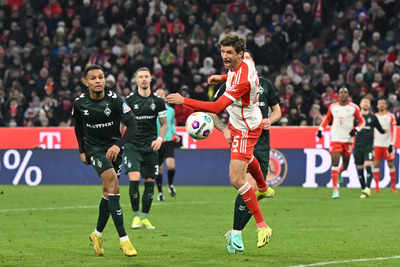The Bayern Munich Juggernaut
Bayern Munich, the undisputed powerhouse of the Bundesliga, has dominated the league for decades, cementing its status as one of the most successful clubs in European football. Founded in 1900, the Bavarian giants have won a staggering 32 Bundesliga titles, including 10 consecutive championships from 2013 to 2022.
Their success is built upon a foundation of world-class players, astute management, and a relentless drive for excellence. Bayern's ability to attract and develop top talent, combined with their financial clout, has allowed them to maintain a consistent level of dominance that has become the envy of their rivals.
Under the leadership of legendary managers like Udo Lattek, Jupp Heynckes, and Pep Guardiola, Bayern have refined their playing style, evolving from a physical, direct approach to a more possession-based, technical game. This adaptability has been a key factor in their sustained success, as they have consistently remained at the forefront of tactical innovation in the Bundesliga.
The Rise of Borussia Dortmund
While Bayern Munich's dominance has been a constant in the Bundesliga, the league has also witnessed the emergence of other powerhouses, most notably Borussia Dortmund. The "Black and Yellows" have established themselves as Bayern's primary rivals, challenging their supremacy both on the domestic and European stages.
Dortmund's rise to prominence can be traced back to the 1990s, when the club won two consecutive Bundesliga titles under the guidance of Ottmar Hitzfeld. In the following decades, Dortmund continued to be a force to be reckoned with, winning further league titles and experiencing periods of sustained success.
The development of Dortmund's renowned youth academy, which has produced world-class talents like Robert Lewandowski, Jadon Sancho, and Erling Haaland, has been a key factor in their success. The club's ability to identify and nurture young players has allowed them to compete with the financial might of Bayern Munich, often leveraging their talent pipeline to achieve remarkable results.
Under the leadership of managers like Jürgen Klopp and Thomas Tuchel, Dortmund have adopted a dynamic, high-pressing style of play that has captured the imagination of football enthusiasts worldwide. Their passionate fan base, known for creating an electric atmosphere at the Westfalenstadion, has further cemented Dortmund's status as one of the most iconic clubs in the Bundesliga.
See more: link w88 fans
The Evolution of the Bundesliga: From Traditional Tactics to Modern Footballing Styles

The Tactical Landscape of the Bundesliga
The Bundesliga has long been known for its tactical diversity, with clubs embracing a range of playing styles that have evolved over time. In the early years of the league, the emphasis was on physical, direct football, with teams relying on strong defending and efficient counter-attacking.
However, as the decades passed, the Bundesliga began to witness the emergence of more nuanced and sophisticated tactical approaches. The influence of prominent managers like Hennes Weisweiler, Udo Lattek, and Jupp Heynckes introduced a greater emphasis on possession-based play, positional rotations, and the development of well-organized defensive structures.
The Impact of Bundesliga Coaches on Tactical Innovation
The Bundesliga has been a breeding ground for some of the most renowned and influential football coaches in the world. Figures like Ottmar Hitzfeld, Felix Magath, and Jürgen Klopp have left an indelible mark on the league, introducing innovative tactical concepts that have gone on to shape the global game.
Hitzfeld, for instance, was renowned for his adaptable, pragmatic approach, often tailoring his tactics to the strengths of his players. Magath, on the other hand, was a pioneer of the high-intensity, pressing-focused style that has become increasingly prevalent in modern football.
Jürgen Klopp's tenure at Borussia Dortmund, in particular, had a profound impact on the Bundesliga. His "Gegenpressing" philosophy, which emphasized relentless pressing and rapid counterattacks, inspired a new generation of coaches and players to embrace a more dynamic, high-octane brand of football.
The Emergence of Analytically-Driven Tactics
In recent years, the Bundesliga has witnessed a growing emphasis on the use of data and analytics to inform tactical decision-making. Clubs have invested heavily in state-of-the-art technology and data analysis to gain a competitive edge, with some teams employing dedicated data analysts and sports scientists to support their coaching staff.
This analytical approach has led to the development of more sophisticated tactical systems, with teams optimizing their formations, pressing patterns, and player roles to maximize their performance. The Bundesliga's openness to innovation has allowed these data-driven tactics to thrive, further contributing to the league's reputation as a hub of tactical evolution.
Fan Culture in the Bundesliga: Passion, Tradition, and the 'Ultra' Movement

The Bundesliga, Germany's top-flight professional football league, has long been regarded as one of the most prestigious and competitive leagues in the world. With a rich history spanning over six decades, the Bundesliga has consistently produced world-class players, innovative tactics, and a passionate fan culture that has captivated audiences globally.
Bundesliga Powerhouses: Bayern Munich's Dominance and the Rise of Borussia Dortmund








